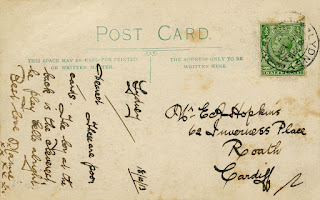I have always found old photographs to be the best stimulus for rekindling memories. This is a photograph of my grandfather, Albert Beanland (1875-1948) which must have been taken in the 1930s or 1940s when he was living along with his wife, Catherine, in Bradford. Albert died in the same year I was born, so I never got to know him - but that smile, those features, that solid Yorkshire stance is very familiar to me.
Whilst reviewing the various on-line records about Albert, I took a look at his entry in the 1939 Register - the special register which was taken just before the outbreak of World War II. By then he was 64 years old and of little interest as far as military conscription was concerned, but he was still working as a textile mechanic and living at 12, Lawrence Street, Princeville, Bradford.
I was vaguely aware that my mother grew up in the Princeville area of Bradford, and this meant that my grandfather had probably spent the last thirty or so years of his life in the same house in Lawrence Street - and that was probably the house that can be seen in the photograph above.
I managed to find Lawrence Street on an old OS map of Bradford which dates from about the time he moved there from his home town of Keighley. And it was then, that I started to realise that maps can be just as good a stimulus to memories as old photographs. To the best of my knowledge, I have never been to Princeville, but looking at the old map was like a conducted tour of names and places that were handed down to me by generations long gone. Horton Dye Works, Legrams Mill, Bradford Beck, Lidget Green : all are names that resonate. My mother spoke this language as did that generation of my Bradford family. It's the language of the mill and the stone terraced house.

























